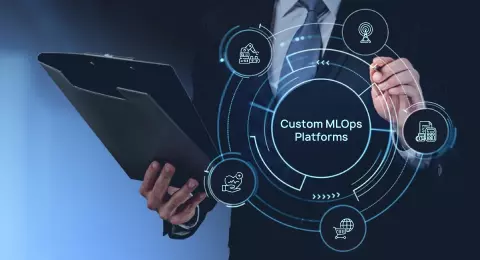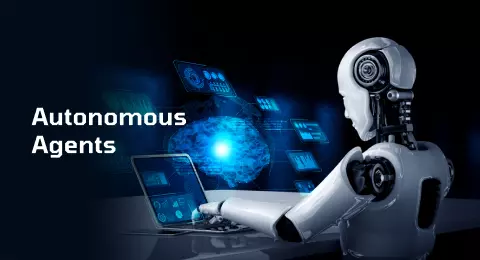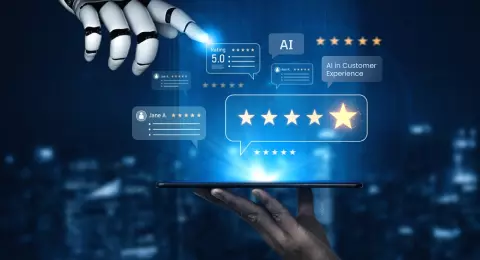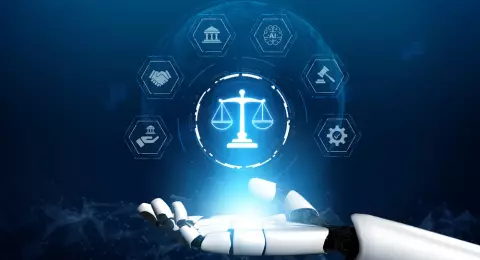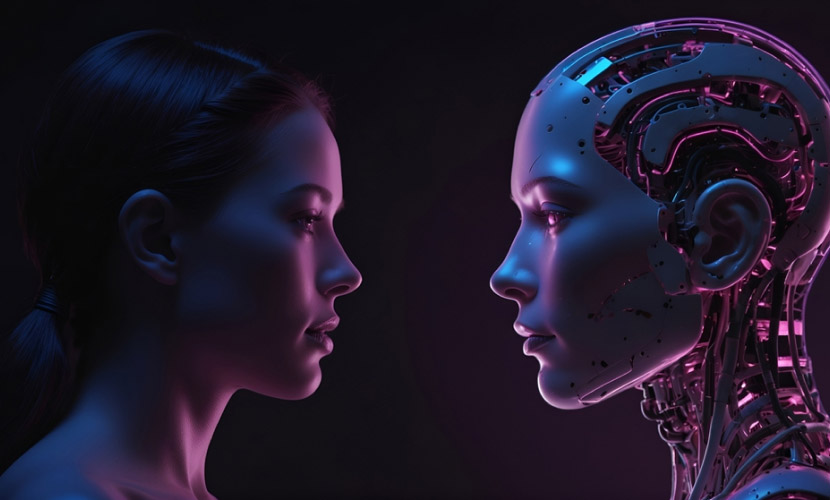
Customer support is going through a major transformation as AI becomes a part of everyday service operations. AI chat support helps businesses respond faster, handle repetitive questions, and stay available 24/7. On the other hand, human chat support brings emotional intelligence and empathy that customers value during complex or sensitive issues.
The real challenge lies in finding the right balance between automation and human connection. This article explores AI vs human chat support comparision and explains how businesses can maximize the impact of AI to create more efficient and meaningful customer interactions.
What is AI Chat Support?
As the name suggests, an AI chat system leverages artificial intelligence to simulate human conversations in digital communication channels. By using this technology, companies offer customer support on their apps and websites. Moreover, customers can receive answers on their preferred channel, such as WhatsApp.
The customer service reduces the need for human agents for repeated tasks, like order tracking, delivery updates, refund status inquiries, etc.
Earlier, most chatbots could only reply based on preset scripts or fixed keywords stored in their database. These are called flow chatbots, and they follow a strict path. That means if a user says X, the bot replies with Y. AI is shaping the future of customer service by enabling systems that go beyond rigid responses. With the help of artificial intelligence (AI) and Natural Language Processing (NLP), chatbots can now understand real conversations better.
This evolution highlights the growing distinction between AI vs human chat support. The global AI chatbot analysis report market is projected to reach $46.641 billion by 2029, at a CAGR of 24.53%. This robust growth is driven by increasing demand for automated customer service solutions and the need for businesses to optimize operational efficiency.
Besides following scripts, AI systems learn from users’ intent to come up with more natural answers. That’s why they are called cognitive chatbots because they “think” and improve responses over time to match the topic of discussion.
AI Chatbot Advantages
Out of many AI chatbot advantages, let’s take a look at four major benefits of leveraging AI in customer service.
24/7 Availability
The real power of AI vs human chat support lies in knowing where each performs best. One of the biggest AI chatbot advantages is round-the-clock instant availability, something human agents simply can’t match. AI-powered chatbots can assist customers with common queries instantly through 24/7 support.
They are best suited for customers looking for self-service options to:
- Get a quick update on the order status
- Quickly learn about products before purchase
Previously, rule-based chatbots (respond according to a fixed script and “if-then” logic) were the primary option for customer support. Now, generative AI is on the scene. It uses natural language processing and large language models to better understand and promptly respond to the context of customer inquiries.
For businesses, this means faster response times, higher customer satisfaction, and reduced dependency on large support teams. It helps brands stay available and consistent, even during peak traffic hours, without adding extra staff.
Cost Efficiency
An IBM report shows that hiring and onboarding a human chat agent can cost up to $8,400. However, AI can handle 80% of the same routine tasks and customer questions at 30% less cost to the company.
Scalability for Future
AI chatbots can handle a growing number of customers without increasing operational costs. Unlike human teams, they are good at managing thousands of chats without any compromise in performance. All they need is consistent training with new data to handle additional products, services, or languages.
Data-driven Insights
As we discussed before, rule-based chatbots are incapable of solving customer problems if the queries do not match their training data. However, AI-powered chatbots can analyze customer data to solve problems in real-time. They can even suggest proactive solutions to prevent problems from occurring. If required, AI chatbots can escalate the issue to a human agent for better issue resolution.
Want to Bring Speed, Accuracy, and 24/7 Availability to Your Customer Support with AI Chatbots?
What is Human Chat Support?
Human chat support involves real people to solve customer queries and concerns through a live chat service. The biggest advantage here is the human empathy that customers get to experience during conversations. A human agent is more capable than an AI chatbot when it comes to adding reasoning and emotional understanding into a conversation.
Human chat support basically works in three layers:
- Tier 1 (Basic support): for common queries like account access, order tracking, or general information
- Tier 2 (Technical support): for complex problems that require product knowledge or technical expertise
- Tier 3 (Escalation support): for high-level issues that require in-depth analysis or approval from senior managers
This layered system ensures every customer gets quick, effective, and highly personalized human assistance.
Human Support Advantages
AI is fast, but it is not yet capable of mimicking the emotion, reasoning, and adaptability of a human-to-human conversation. That said, a human support ensures the following advantages over an AI chat support:
Trust Building through Empathy
Human agents can reflect emotions through writing and in conversations. If a customer is upset or confused, they can slow down and use reassuring words to control the situation. They can even wisely determine when to offer small gestures like discounts or personal follow-ups. Over time, these actions build trust and emotional safety.
Good at Handling Complex Issues
AI works best with patterns. Yet when you give it a question beyond its training data, it often gets confused. It cannot use logical and creative powers to approach a complex problem like humans. For example, during a rare payment error, a human agent can check multiple systems, talk to technical teams, and come up with a reasonable answer. AI chatbots, however, will simply suggest pre-defined solutions, which mostly involve escalating the issue to a human agent.
Deeper Personalization
One of the biggest human support advantages is personalization. Human agents don’t need to analyze context by keywords. They remember details from past conversations. A hotel booking agent, for instance, may suggest a favorite room to a returning guest with an emotional connection that AI bots can’t.
Human agents can handle value. But what happens when your customer base keeps growing and every query demands the same level of care? That’s when hybrid chat support models become imperative.
Hybrid Chat Support Models
A hybrid chat model combines AI efficiency with human intelligence to promise faster, empathetic support experiences for customers.
How it Balances AI vs Human Chat Support
Hybrid chat support models have three architectural components:
- 1. AI-powered automation to speed up routine customer tasks
- 2. Human-centric interaction for empathetic support as per customer expectations
- 3. Feedback loops for human agents to continuously refine AI responses
Customers first interact with an AI chatbot. If it is one of the frequently asked questions, the chatbot can easily handle it using NLP.
It can instantly respond to questions like:
- Where is my order?
- How do I reset my password?
- What are your business hours?
If the customer comes up with a complex issue that requires empathy, it automatically routes the conversation to a human agent.
Now, the agent receives the full chat history, customer data, and previous messages, systematically arranged by AI. This gives the agent the edge to start the conversation right from the previous message.
Key Benefits
- AI handles the initial response to reduce waiting time for customers
- AI resolves repetitive queries to reduce workload for agents
- Agents utilize the extra time to focus on complex queries with more care
- All conversations are analyzed by AI to generate insights for better decision-making
To understand how each performs in different situations, let’s look at a quick AI vs Human chat support comparison that highlights their key strengths and limitations.
AI vs Human Chat Support: Key Differences
The table below highlights the core differences in AI vs human chat support across key parameters that play a major role in shaping customer satisfaction.
| Aspect | AI chat support | Human chat support |
|---|---|---|
| Availability | 24/7 availability | Limited to working hours and shifts |
| Response time | Instant reply | May take time to read, type, or handle multiple chats |
| Consistency | Uniform and error-free answers | May be subject to human error |
| Scalability | Easy to scale as you grow | Limited by the number of agents available |
| Emotional understanding | Cannot truly understand emotions or tone | Good at sensing emotions and responding with empathy |
| Complex problem solving | Struggles with unclear or unusual queries | Capable of using critical thinking to handle complex issues |
| Personalization | Learns user patterns but lacks emotional depth | Builds genuine rapport and personal connection |
| Training and cost | One-time setup, but requires periodic training | Needs regular training and a higher ongoing cost |
| Data handling | Store and analyze large data for insights | May record limited details, relies on manual notes |
| Best use case | Repetitive tasks, FAQs, quick updates | Complaints, escalations, and sensitive situations |
The table clearly summarizes that AI is ideal for managing repetitive queries, while the human support advantages lie in trust-building.
Choosing the Right Model for Your Business
When evaluating AI vs human chat support, consider your company size, industry type, and customer preferences as major decision influencers.
When to Choose AI Chat Support
- If your business receives a high volume of repetitive queries
- Customers need a faster response time at any hour of the day
- You have a limited budget for operational costs
Ideal Scenarios:
- To automate order tracking in e-commerce
- To manage bill payments in telecom
- To send service outage notifications for utilities
Note: These AI chatbot advantages should be used to free human agents to focus on escalations.
When to Choose Human Chat Support
- If emotional intelligence matters the most in most conversations
- Customers prefer live agents actively listening to their queries
- Frustrated customers are to be surprised with small gestures like discounts or personal follow-ups
Ideal Scenarios for Business:
- For assisting customers with medical guidance in healthcare
- For crisis handling in the hospitality and travel sector
- For sensitive case discussions with legal clients
When to Choose Hybrid Chat Support
- If you have a growing base of customers
- Your customers need speed in response, and empathy in conversations
- Agents need to be freed of repetitive queries to focus on complex cases
Ideal Scenarios for Business:
- Government services where AI handles documentation, and human agents deal with appeals
- Education sectors where AI supports student enrollment and teachers provide personal guidance
Conclusion
The secret to handling a growing customer base lies in exploring the power of hybrid chat support models. A basic understanding of AI vs human chat support models highlights how each approach serves customers in unique ways. Together, they create faster, more personal interactions that boost satisfaction. Start building that balance with our AI chatbot development services designed to scale your customer experience.
FAQs
In terms of speed, availability, and consistency, AI chatbots outperform human support by a good margin. However, when it comes to emotional understanding, complex problem-solving, and personalized interactions, human agents are preferred by the customers.
Rule-based chatbots start at around $3,000 for handling basic FAQs or lead generation. Generative AI chatbots with NLP, multilingual support, and CRM or ERP integration may range from $7,000 to $50,000 or more. There are also additional costs involved for training data, maintenance, and periodic updates to improve accuracy.
Industries like e-commerce, banking, healthcare, and hospitality benefit from hybrid support. In such industries, customer support is focused on both speed and empathy. So, AI aids in speed by automating mundane tasks or information analysis, whereas human agents focus on giving a personalized experience with empathy.
The transition should follow a systematic process. First, make a list of customer queries your team frequently encounters every day. Use AI chatbots to handle those queries with pre-defined outputs for a small group of users. Initially, train your human agents to step in when the AI cannot resolve an issue. Gradually increase the capacity of AI chatbots as accuracy improves.
